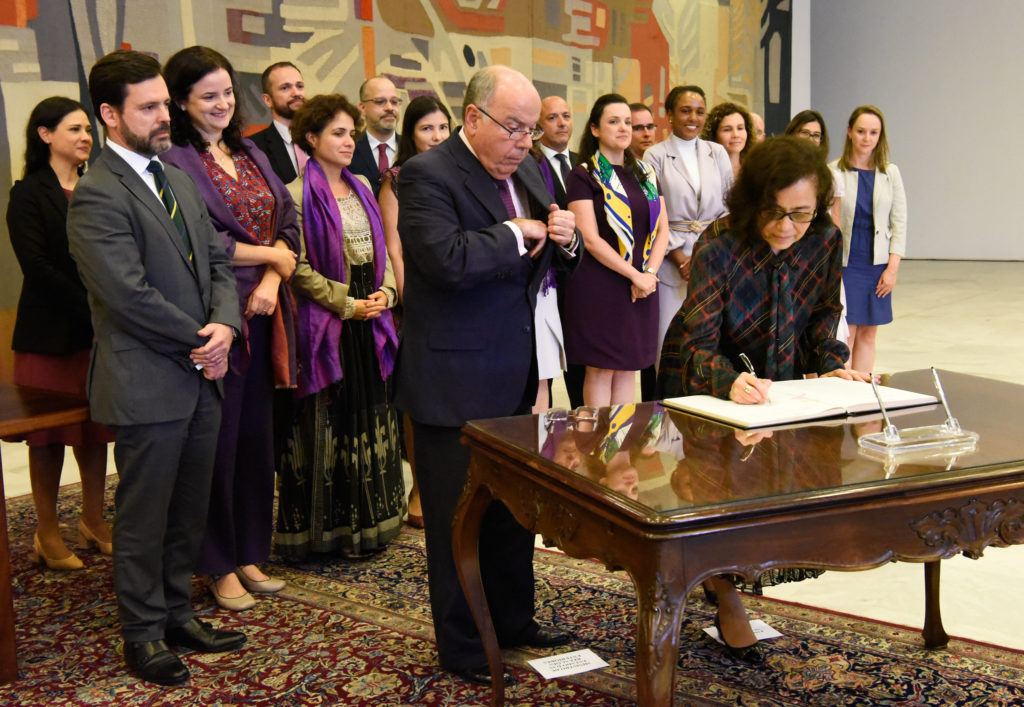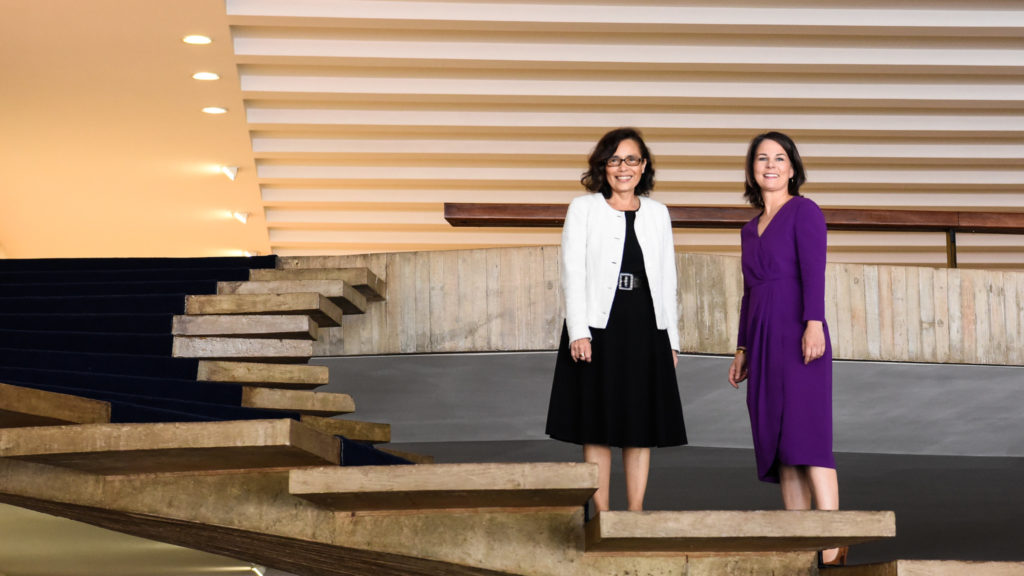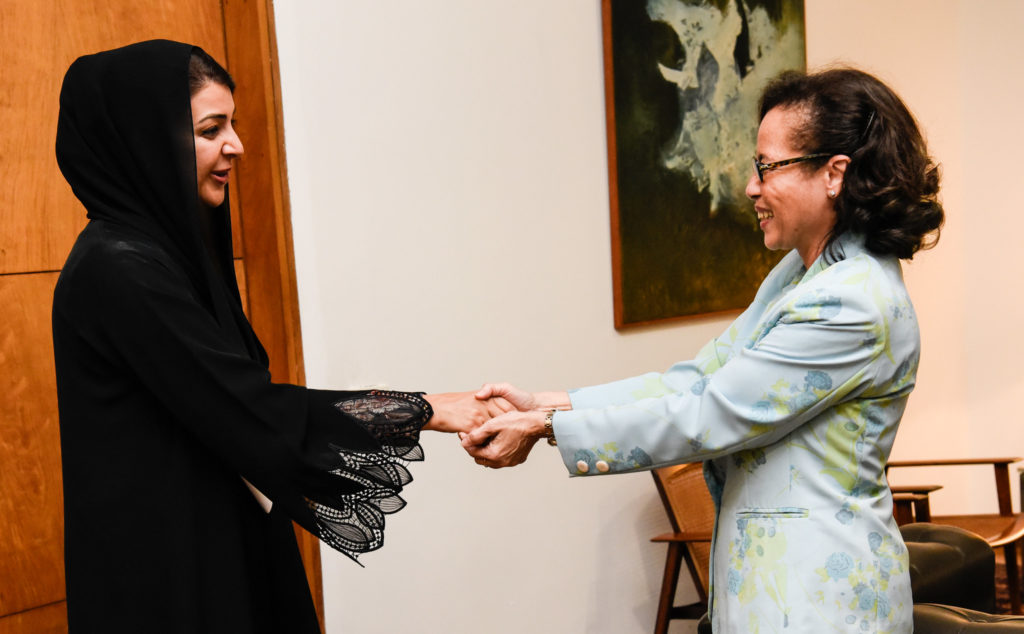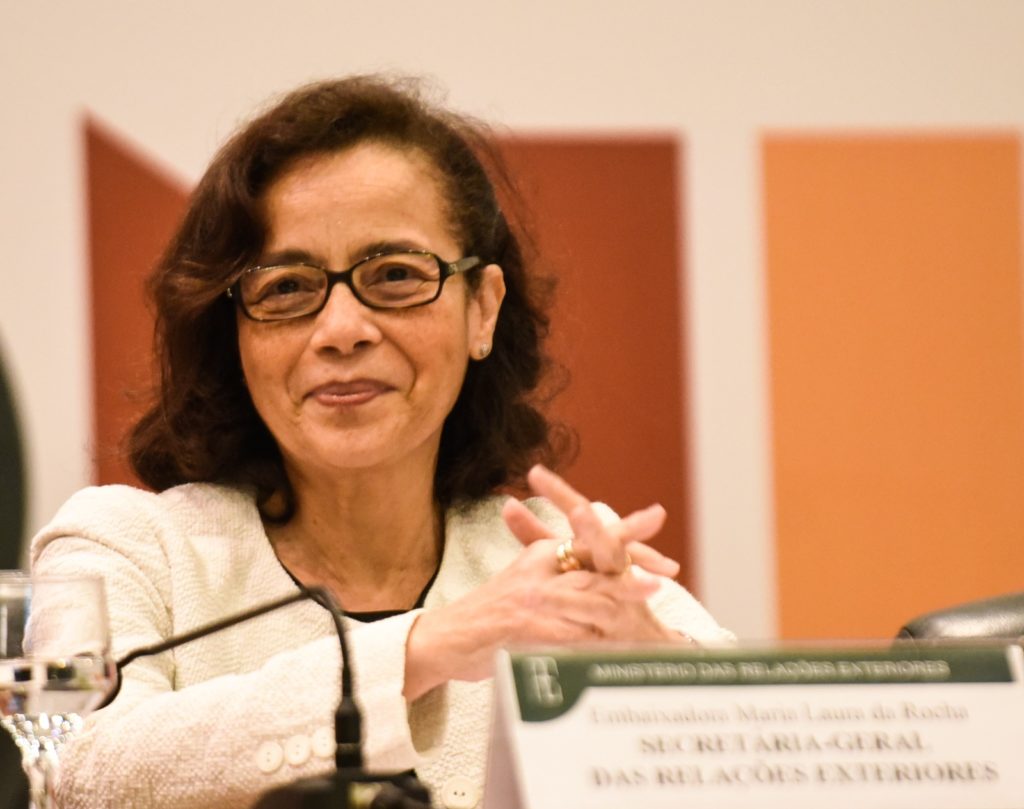São Paulo – Maria Laura da Rocha was in Moscow during Brazil’s rapprochement with the Soviet Union. She was also in the Fernando Henrique Cardoso administration helping to consolidate the democracy in Brazil. And she accompanied Luiz Inácio Lula da Silva on his trips as one of the most sought-after leaders across the world.
Rocha is the first woman to become secretary-general for Foreign Affairs of Brazil – a position she took last January at the beginning of Lula administration – and she brings a whole deal of the history of the country and the career ascension of women. She was the first woman to take office as permanent delegate of Brazil at the United Nations Educational, Scientific and Cultural Organization (UNESCO), as Brazil’s representative at the Food and Agriculture Organization (FAO) of the UN, and as Brazil’s ambassador to Hungary and Romania.

But none of this seems to change the laidback style of the new head of the General Secretariat of Brazil’s Foreign Ministry, who recounts her life story as a script that played out naturally and from the perspective of someone who focuses on the good things. Career setbacks? “None,” she said. “For me, all challenges were designed to be overcome,” she said, commenting on a health issue that was overcome by her oldest daughter.
Having worked at the Foreign Ministry since October 1978, Rocha took relevant positions in Brazil and elsewhere across different administrations, and she noted the world has gone through many advancements over this period. “Throughout my career, many positive moments were experienced regarding the human path towards sustainable development,” she said.
But she sees a step backwards in the current international landscape and changes in diplomacy and politics. “It’s now harder to bring politics back to the quality level it once had, to seek and find ways that are palpable, negotiable. Everything has become more easily aggressive. You don’t argue ideas or projects – you argue positions like it was a football match, with only two sides, but politics are multifaceted,” she said.
In such context, ambassador Rocha sees Brazil as taking up the role of dialogue. “The fact that you are friends doesn’t mean you have to think the same. You’re allowed to think differently, you’re allowed to respect our differences, and you’re allowed to be different. That’s diplomacy, we seek a point of contact, a point of dialogue, and not amplifying the differences that are no good for us,” she said.
The diversity in the Foreign Ministry, with people representing the population from across the regions, classes and genders, must be taken into account for the international action of the country, according to the diplomat. “That’s how we’re and that’s how the world sees us: A mixed country, where there’s room for everybody, where everyone is well represented, and that’s why we talk to everybody. We don’t fight. Our global partners are everyone; we manage to talk to everyone.”
Rocha on diversity
Rocha being at the General Secretariat reflects the room provided for such diversity in the contemporary diplomacy. Born in the neighborhood of Jacarepaguá in the city of Rio de Janeiro, the diplomat came from a public school and a family of civil servants. As a teenager, at 14, she decided she wanted to be a diplomat and focused her efforts to pass the exam for the Rio Branco Institute, which trains Brazilian diplomats.
What prompted her was a great interest in the world and different cultures. “I’ve always read a lot. My father is a Philosophy professor and had a library that I learned how to use with great care,” she said. The diplomat was admitted in the Brazilian diplomacy at 21, on her second attempt, and she finished her higher education there.
Her stint at the Rio Branco Institute and the early years of her career took place during the military dictatorship in Brazil. Her first overseas position was at the Embassy of Brazil in Rome, as second-secretary, where she saw ambassadors come and go, and then as second- and then first-secretary at the Embassy of Brazil is Moscow.

“In Moscow I was absolutely impressed as it was a whole period of rapprochement of a redemocratized Brazil and the Soviet Union. We hadn’t severed ties, but there had been a cool-down, so during that period we had visits from nearly all ministers and president [José] Sarney. It was a very intensive time of work, of rapprochement,” she said.
Rocha was called upon to join the staffs of different administrations in Brazil. She was a deputy director general of Management of the Presidency of the Republic in the Fernando Collor de Mello administration. Under the administration of Fernando Henrique Cardoso, she was chief of staff of the Strategic Affairs secretary of the Presidency of the Republic, as well as chief of staff of ministers. During that time, Rocha helped establish the Ministry of Defense, when it was created out of merging four existing military ministries.

In the second Lula term, Rocha worked with FM Celso Amorim as chief of his staff. “Everyone wanted to see the president. I had never seen so many authorities from the developed world, the developing world; everyone wanted to reach the Brazilian leader. It was impressive,” she said.
As minister-counsellor of Brazil in Paris, she also saw Brazil being celebrated by the French in the Year of Brazil in France in 2005. “There wasn’t a single French municipality that hadn’t celebrated Brazil,” she said. Some 250 events were on the official schedule, featuring curatorship support and resources to carry them out, but the diplomat said many took place spontaneously.
Since she became an ambassador Rocha has always being the first woman to take the overseas positions she took but in settings that were well accustomed to female leaders like UNESCO, FAO, Hungary and Romania. When discussing her career, the diplomat shows a special fondness for her stint at UNESCO and highlights the work at FAO in a time when Brazil left the Hunger Map. “The goal of the organization is bringing to the humanity a sense of peace, of how to achieve peace,” she said on the UNESCO.
Rocha on family
At some points in her career, Rocha asked to work in some places for family reasons like taking care of her daughter who was born with cerebral palsy together with her husband. Married to Italy’s Sandro Melaranci, a food entrepreneur she met in Rome, she has two daughters, 34-year-old paralympic athlete Elisa and 32-year-old opera singer Marina. The secretary-general of the Foreign Ministry said she learned from the story of her child and her Paralympic teammates.
“My daughter was born with cerebral palsy and became a paralympic athlete. She represented Brazil in two Paralympic Games, mounting a half-ton horse and doing exercises with a side of her body that doesn’t usually work. I learned from her. I learned from my parents, and I learned from my daughters,” she said.
Rocha on the General Secretariat
As president Lula won the election, Rocha expected a reformulation at the Foreign Ministry, but she doesn’t attribute the invitation to becoming secretary-general just to the fact she’s a woman, although she considers it may have weighted on the choice. “Ultimately for you to seat on this chair it isn’t enough to be a man or a woman. You have to know this house, have experience, and ideally get along with everyone, or else you will have trouble coordinating. We don’t command, we coordinate a work,” she said.
The position of secretary-general ranks second only to the minister himself at the Foreign Ministry, who currently is Mauro Vieira, a person she had met in various moments of her career. The General Secretariat has under its umbrella several other secretariats, including regional ones like the Secretariat for Africa and the Middle East or Latin America and the Caribbean, and thematic ones like the Secretariat for Multilateral Political Affairs, and others.
Rocha on Arab states
On her trips around the world, Rocha visited nearly all Arab countries, especially when accompanying the travels of Lula to the region. “We’ve always had a good relationship, and we expect it to continue,” said the diplomat on Brazil-Arab ties. The ambassador highlights the Arab culture present in Brazil and the strong trade with the region. “We have in Brazil a very strong Arab culture from the different groups that came here and are now part of our culture,” she said.
Translated by Guilherme Miranda




